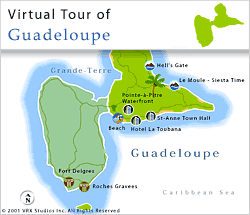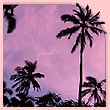
Guadeloupe | Hotels
This butterfly-shaped island - actually two isles - is one of few Caribbean places where tourism is not king. Sugar is. Since Guadeloupe is essentially an oversees department of France, expect fine cuisine, tasteful surroundings and a clothing-optional beach or three.The central market in bustling Pointe-a-Pitre is a beehive of people bargaining and buying piles of papayas, tomatoes, breadfruit and assorted other goodies.Guadeloupe - Destination guide 

Caribbean Information Centre
Caribbean.com is a travel site specializing in The Bahamas, Bermuda and the Caribbean region. Our destination guides contain thousands of listings and virtual reality map tours to help you plan your perfect vacation. Listings include hotels, restaurants, activities, attractions, diving, snorkelling and shopping for 50+ destinations.Guadeloupe feature 
CARIBBEAN.COM 2004 - COURTESY DUPUCH PUBLICATIONS

All about Guadeloupe
Guadeloupe is not like France, it is France - a French Overseas Departement, something like Hawaii's relationship with the US. This island has served as a French West Indies administrative centre since the 1700s. In 2003, however, St Barts - more formally St Barthelemy - and St Martin separated from Guadeloupe but retained their affiliation to France.
Guadeloupe geography suggests the wings of a butterfly. The more northern wing is the venue for Pointe-a-Pitre, main commercial centre and seaport on Grande-Terre. The southern wing, known as Basse-Terre, boasts a botanical garden, national park, and a volcano overlooking waterfalls that spray cool mists over all who come too close. Look at the map and you will find at least nine islands within the Guadeloupe archipelago. Locals call their island "The Pearl of the French West Indies."
As befits a part of France, the food and wine is mainly French, fresh and fabulous. The island's most colourful event is the annual Fete de Cuisinieres, or Festival of Women Cooks. Female chefs cater a five-hour Creole banquet of such specialities as lobster, rice and crabs, special pastries, a potent drink called ti'punch, and jambon de Noel, or Christmas ham. Ti'punch is an island rum drink with sugarcane syrup and fresh lime.
Other festivals include Carnival with streams of dancers dressed as imps and buccaneers; Bastille Day, a mid-July festival of the arts; and All Saints,' when cemeteries are lit up with candles so that the dead can see their still-living friends who stay up all night in honour of the dead.
Coffee aficionados should be sure to treat themselves to Guadeloupe's high-quality, home-grown coffee. Locals like their coffee Cuban style - black as night, sweet as love, hot as hell. Speaking of that, the north point of Grande-Terre is called La Porte d'Enfer, the Door of Hell, but more closely resembles a tropical Garden of Eden.
Basse Terre is the more rugged of Guadeloupe's butterfly wings. A popular tourist draw is the area's La Soufriere (Sulphur) Volcano, rising to 4,977 feet. All around is the Botanical Gardens and Parc National with a virgin rainforest, spectacular waterfalls, and canyon routes. This vast jungle overlooks the deep-blue waters which gave the island its Arawak name Karukera, believed to mean "island of beautiful waters."
As for the beaches, nudism has been a French reality since 1778. The idea of healthy living in the outdoors and without benefit of clothing came into full play during the 1920s. Topless is normal but most West Indians leave that sort of thing for tourists. Skinny dipping is permitted on some beaches. Some beaches are reputed to be hangouts for young men who are not bashful about propositioning female tourists.
Pointe-a-Pitre has a rather grand airport, the better to serve the military whenever the political scene gets hot. In the 1970s, violence broke out over the issue of independence. That situation has since calmed down, especially after French taxpayers more or less rebuilt the archipelago after the devastating Hurricane Hugo in 1989.
So what to do besides beachcombing, sea diving, exploring jungles, and marvelling at the castle-like formations at La Pointe de Chateaux? Among all-inclusive resorts is the Paris-based Club Med La Caravelle.
Offshore islands include Les Saintes, with one of the world's most beautiful bays.
Zouk is the French Caribbean's popular in music. You hear its double beat and hypnotic West African rhythm in buses, bistros, discos, bars - all over the place.
Guadeloupe - Items of interest 
Accommodations
Dining & entertainment
Activities, attractions, diving, golf and sports
OTHER LINKS AND INTERESTS

Sign up, its free!
Get deals & specials for
Caribbean Vacations
CLICK HERE
*we do not release contact information
CARIBBEAN.COM VACATION SPECIALS
Click here for vacation specials from our partners: Hilton, Westin, Sheraton, Marriott and more





